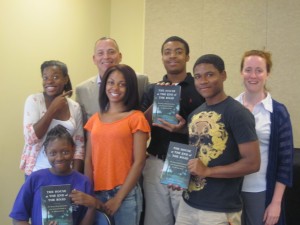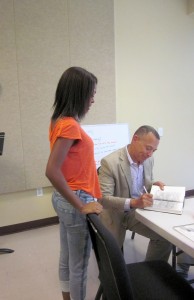By Gretchen Barkhuff
 This past Tuesday, July third, Ralph Eubanks visited the PEN/Faulkner summer program to discuss his non-fiction book The House at the End of the Road: The story of Three Generations of an Interracial Family in the American South.
This past Tuesday, July third, Ralph Eubanks visited the PEN/Faulkner summer program to discuss his non-fiction book The House at the End of the Road: The story of Three Generations of an Interracial Family in the American South.
Reflecting Eubanks’ book, the student-directed conversation largely focused on identity and labeling. In The House at the End of the Road, Eubank’s discusses that there is a generational gap between the way that he and his children self-identify. As Eubanks explained to the students, despite having learned about his interracial family roots, he strongly identifies as a black man—an identity that was shaped growing up during the Civil Rights movement. In contrast, his children, who have grown up in an openly interracial family and largely welcoming community, do not fully understand why people—especially adults—place such a strong emphasis on racial identities. One of his sons, recognizing the plurality of his ancestry, chooses to not racially identify but culturally identify as American.
Eubanks asked the students about their own perspectives on identity and race and they largely built on his son’s sentiment that simple racial categorization neither reflects reality nor should it be something that divides people. One student, for instance, beautifully articulated her own struggle with people who desire to box her into a limiting label even though she has one Italian parent and one Jamaican parent. Other students pointed out that a person’s race does not reflect her or his personality and should not be the sole component of a person’s identity. As they put it “if you’re cool, you’re cool,” race doesn’t determine friendship.
Notably, Eubanks believes this shift away from focusing on race is an important and necessary generational shift. He argues that Americans need to move towards recognizing a unity rather than focus on racial divisions and the more open mindset of younger generations will help get America there. This does not mean that you need to lose your personal narratives and cultural traditions—Eubank’s entire book is about the significance of understanding family history—but rather that we can keep these and still have a broader and salient American identity that encompasses all other identities.
The students had so much fun getting to know the  writer behind these ideas that they didn’t want him to leave. Of course, when it was time to close, the student’s didn’t miss a beat in asking to get their books signed.
writer behind these ideas that they didn’t want him to leave. Of course, when it was time to close, the student’s didn’t miss a beat in asking to get their books signed.
Eubanks expressed his own excitement over getting to meet the great group of students we have with us this summer. We, in turn, are immensely grateful to Ralph Eubanks for visiting us and sparking such an evocative discussion.
